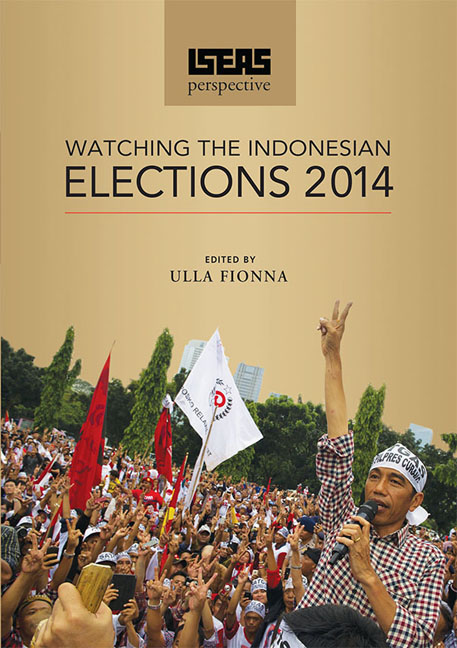Book contents
- Frontmatter
- Contents
- Foreword
- Introduction
- 1 The Gubernatorial Race in Jakarta: Background and Implications
- 2 Indonesian Parties Struggle for Electability
- 3 Who Will Be Indonesian President in 2014?
- 4 Indonesian Presidential Election Forcing Rejuvenation of Parties
- 5 Resisting Democracy: Front Pembela Islam and Indonesia's 2014 Elections
- 6 Getting to Know the Contestants of the 2014 Indonesian Parliamentary Elections
- 7 A Snapshot of the Campaigning in Indonesia's 2014 Legislative Elections
- 8 Unpacking the Results of the 2014 Indonesian Legislative Elections
- 9 Indonesia's 2014 Legislative Elections: The Dilemmas of “Elektabilitas” Politics
- 10 The Islamic Factor in the 2014 Indonesian Elections
- 11 Vote-buying in Indonesia's 2014 Elections: The Other Side of the Coin
- 12 Gap Narrows Between Candidates in Indonesian Presidential Elections
- 13 Analysing the Economic Platforms in the Indonesian Presidential Election
- 14 Indonesian Islamic Parties After the 2014 Elections: Divided and Self-Centred
- 15 Safeguarding Indonesia's Pluralism: An Essential Task for Joko Widodo
- 16 Jokowi's Key Economic Challenge: Improving Fiscal Policy for Equitable Growth
- 17 Crossing the River While Avoiding the Stones: Jokowi's Run-up to the Presidency
- 18 Post-elections Indonesia: Towards a Crisis of Government?
- Epilogue: Jokowi's First Months: Compromise Cabinet, Subsidy Cuts, and Corrupt Coalition
1 - The Gubernatorial Race in Jakarta: Background and Implications
Published online by Cambridge University Press: 29 July 2017
- Frontmatter
- Contents
- Foreword
- Introduction
- 1 The Gubernatorial Race in Jakarta: Background and Implications
- 2 Indonesian Parties Struggle for Electability
- 3 Who Will Be Indonesian President in 2014?
- 4 Indonesian Presidential Election Forcing Rejuvenation of Parties
- 5 Resisting Democracy: Front Pembela Islam and Indonesia's 2014 Elections
- 6 Getting to Know the Contestants of the 2014 Indonesian Parliamentary Elections
- 7 A Snapshot of the Campaigning in Indonesia's 2014 Legislative Elections
- 8 Unpacking the Results of the 2014 Indonesian Legislative Elections
- 9 Indonesia's 2014 Legislative Elections: The Dilemmas of “Elektabilitas” Politics
- 10 The Islamic Factor in the 2014 Indonesian Elections
- 11 Vote-buying in Indonesia's 2014 Elections: The Other Side of the Coin
- 12 Gap Narrows Between Candidates in Indonesian Presidential Elections
- 13 Analysing the Economic Platforms in the Indonesian Presidential Election
- 14 Indonesian Islamic Parties After the 2014 Elections: Divided and Self-Centred
- 15 Safeguarding Indonesia's Pluralism: An Essential Task for Joko Widodo
- 16 Jokowi's Key Economic Challenge: Improving Fiscal Policy for Equitable Growth
- 17 Crossing the River While Avoiding the Stones: Jokowi's Run-up to the Presidency
- 18 Post-elections Indonesia: Towards a Crisis of Government?
- Epilogue: Jokowi's First Months: Compromise Cabinet, Subsidy Cuts, and Corrupt Coalition
Summary
Of all the direct elections for local leaders (known in Indonesian as Pilkada) held in 2012, the gubernatorial race for Jakarta DKI was definitely the one to watch. As a contest for the most important posts for Indonesia's sprawling capital city with almost 7 million registered voters, the Jakarta election serves as a barometer for local elections throughout the Indonesian archipelago.
During the first round of the local election on 11 July 2012, the popular challenger, Joko “Jokowi” Widodo, led with almost 43 per cent of the votes, while the incumbent, Fauzi “Foke” Bowo, trailed with 34 per cent. As none of the candidates garnered more than 50 per cent of the votes, the two leading candidates went on to a second round run-off.
And so, on 20 September 2012, Jakarta voters went to the polls a second time to elect their governor and deputy governor. Quick count estimates showed Jokowi winning with at least 53 per cent of the votes, and already that same day, Fauzi Bowo congratulated the new governor-elect. The Jakarta General Election Commission officially announced on 29 September that Jokowi had won 53.82 per cent of valid votes, winning the majority of the vote in all five municipalities of Jakarta. Fauzi Bowo had garnered 46.18 per cent of valid votes.
On 15 October, Joko Widodo and his running mate Basuki Tjahaja Purnama were installed as governor and deputy governor of Jakarta respectively, and became the second pair to be directly elected to two of the nation's most coveted offices.
DECENTRALIZATION AND DIRECT ELECTIONS FOR LOCAL LEADERS
In reaction to the over-centralization of state powers during the Suharto era, Indonesia embarked on a path of decentralization with legal reforms in 1999. Law No. 22/1999 and Law No. 25/1999 instituted the devolution of political authority and distribution of revenues respectively to districts and municipalities. This gave much greater power and autonomy to local leaders and local parliaments. With more at stake in terms of resources made available at the local level, political elites at that level lobbied for the proliferation of districts and municipalities. From a total of 341 in 1999, the number of districts and municipalities grew to 440 by 2004, and now stands at around 500.
- Type
- Chapter
- Information
- ISEAS PerspectiveWatching the Indonesian Elections 2014, pp. 1 - 7Publisher: ISEAS–Yusof Ishak InstitutePrint publication year: 2015

